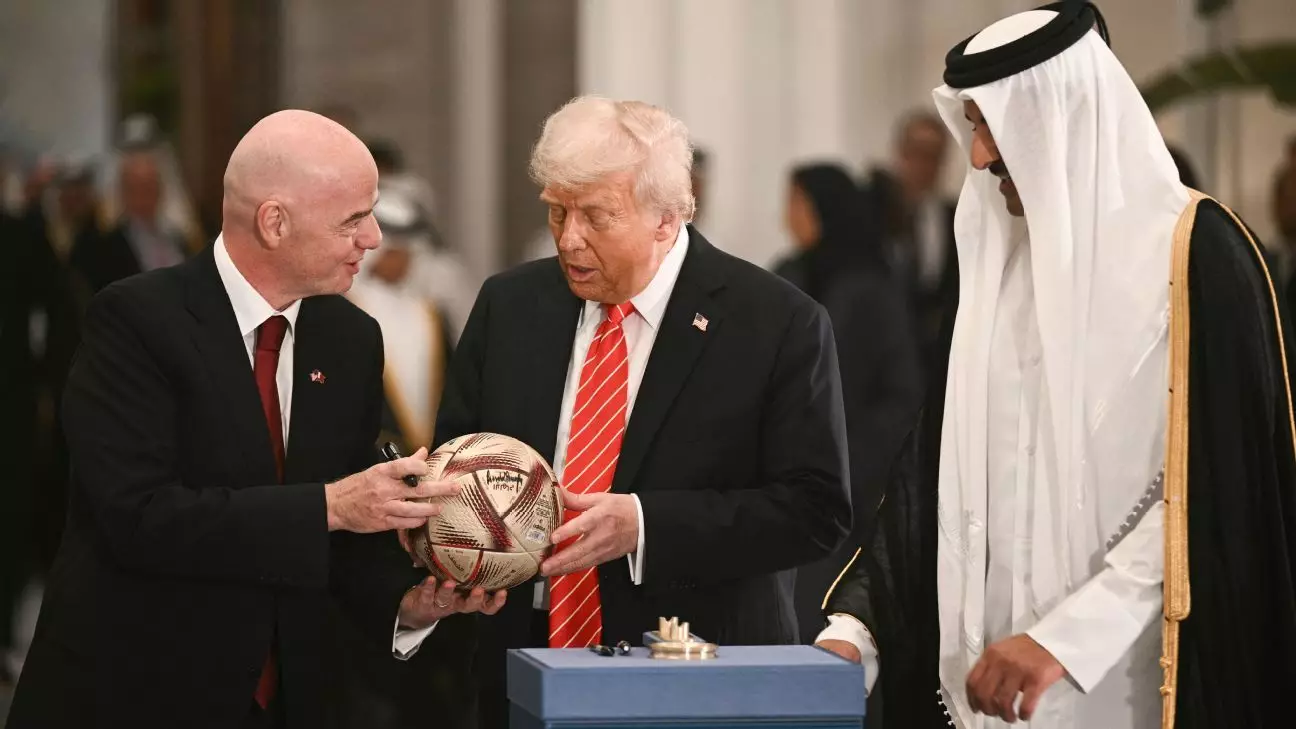The annual gathering of FIFA’s 211 member federations is a crucial event on the global soccer calendar, yet this year’s opening was marred by an unanticipated yet emblematic delay. Gianni Infantino, FIFA’s president, set the stage for a tumultuous meeting by arriving late from a state visit in the Middle East—a trip that raises questions about the priorities of soccer’s governing body. His tardiness was not merely an administrative hiccup; it signified larger issues of governance, responsibility, and the intertwining nature of soccer and global politics.
Infantino’s choice to prioritize a diplomatic mission in Doha over timely participation in a critical meeting with soccer officials illustrated a shift in focus that many within the sport might view as misdirected. Diplomacy, while significant, should never come at the expense of the responsibilities tied to the beautiful game. For an organization tasked with upholding the integrity of soccer, such choices can create a perception of being out of touch with the grassroots realities of the sport.
The Costs of Political Endeavors
While Infantino maintained that his presence was essential for representing soccer interests on a political stage, the fallout from his late arrival was palpable. European officials like Aleksander Ceferin, President of UEFA, were seen departing early, leaving a conspicuous void among the senior representatives at a meeting supposedly pivotal for the future of international soccer. Their early exits could be interpreted as discontent over Infantino’s professional judgment, particularly at a time when relationships between FIFA and regional federations are scrutinized.
The underlying question here is whether Infantino’s political engagements will compromise FIFA’s integrity as it approaches its responsibilities for the 2026 World Cup. The World Cup should be a celebratory event for football fans globally, yet the political overshadowing of its governance raises concerns. The choice to participate in state visits over engaging with national federations signals a potential conflict of interests, and an alarming trend of political undertones seeping into the operational aspects of soccer governance.
The Underlying Dynamics at Play
Amidst the late arrivals and early exits, Infantino’s apologies cited flight issues, but detractors might say that there’s more than meets the eye. Questions arise about the selection of allies in the world of politics, particularly regarding partnerships with controversial leaders and nations. Infantino’s connections with the U.S. president and Gulf monarchies, while beneficial for individual diplomacy, put FIFA’s image on shaky ground given the scrutiny surrounding these regimes’ human rights records and their history in international sports.
The gracious praise by Paraguayan President Santiago Peña toward Infantino, labeling him a “personal friend,” raises eyebrows as well. Such personal relationships can cloud judgment when making significant decisions affecting global soccer. If FIFA is to maintain any semblance of impartiality and fairness, its leadership must tread carefully in fostering ties that might appear self-serving or disconnected from the ethical responsibilities of a governing body meant to oversee a universal sport.
The Future of FIFA: A Balancing Act
As FIFA gears up for the 2026 World Cup—a monumental event shared between the United States, Canada, and Mexico—this annual meeting was more than just a formality; it was an opportunity to lay the groundwork for future success. However, with so many key figures absent or choosing to leave prematurely, what does this bode for FIFA’s ability to navigate the complexities of modern soccer?
With the world watching and escalating concerns over leadership decisions, Infantino must make a concerted effort to bridge the seemingly widening gap between the political and the sporting realms. The recent engagements in the Middle East, while politically strategic, should not come at a cost to the core mission of FIFA: to grow and govern the game transparently and equitably.
Ultimately, as we witness these dynamics unfold, the challenge lies not just in managing soccer’s rise on the international stage but in ensuring that integrity, respect, and the simplistic joy of the game remain at the forefront of FIFA’s agenda. The stakes are high, and how Infantino and his team react will determine much more than the outcomes of meetings—it will shape the very future of soccer itself.

